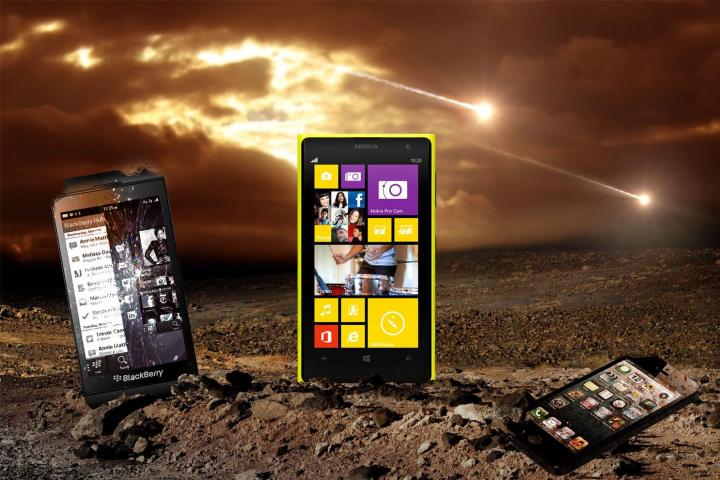
There are few markets as active and competitive as smartphones, and every few months, we get a fresh look at who’s making gains and who’s losing out. Multiple companies have reason to celebrate. Both Lenovo and Microsoft have edged out small victories, and smartphones themselves finally outsold regular cell phones. Below are the major victories and losses we’re witnessing over the spring and summer of 2013, based on Gartner’s latest quarterly smartphone sales figures.
Phone Manufacturers: Winners and Losers
Lenovo becomes a power player: With smartphone sales almost reaching 11 million units, Lenovo rose to fourth place for the first time. It’s sales are up 144 percent from a year ago and 61 percent from last quarter. It’s currently less than a million sales shy of LG, which means it may very well be the third most popular smartphone vendor in three months time, right behind Apple and Samsung. But with a market share of 4.7 percent, fourth place doesn’t buy you a large piece of the pie in the world of phones. Most of Lenovo’s sales likely come from China. It hasn’t launched any phones in the United States.
Samsung continues dominating like crazy: Samsung, of course, continued its insane domination of all phone sales, with more than 107 million mobile phones (71 million smartphones) sold around the world in the last three months. In case you’re wondering, one year ago Samsung sold 45 million smartphones and 90 million total phones. It has roughly held onto its market share as the industry has doubled in size, rising from about 30 percent to 32 percent in a year.
Apple struggles to keep pace: The iPhone 5 is not exciting people as much as previous iPhones. Apple held its ground this quarter, taking its typical second-place trophy with 32 million smartphones sold, but it definitely isn’t keeping pace with the market. It’s sales have only increased by about 3 million in the last year, while all of its neighbors – Samsung, Lenovo, ZTE, and LG – have seen smartphone sales almost double. It’s market share fell from 19 percent to 14 percent. Hopefully the next iPhone will turn things around and help Apple start increasing its sales.
Nokia keeps falling apart: Like BlackBerry, Nokia’s sales are still heading downward. It failed to break into the top five most popular smartphone makers and its total phone sales dropped from 83 million a year ago to 61 million, dropping from about 20 percent market share to 14 percent. Unless Nokia figures out a way to get people to buy it’s Lumia Windows Phones in much larger volumes, it will soon fade away completely as flip phone sales dissolve around the world.
Phone operating systems: Winners and losers
Windows Phone finally achieves … something: For the first time, Windows Phone has finally overtaken BlackBerry, a company/OS that is struggling so much that it’s up for sale. Windows Phone posted modest growth from 4 million units a year ago to 7.4 million this quarter, rising from 2.6 percent of the market to 3.3. It’s not nothing! BlackBerry, meanwhile, fell from 5.2 percent or 8 million sales to just over 6 million this quarter. BlackBerry 10 has yet to be the saving grace the Canadian manufacturer needed.
Android’s land grab: Partially fueled by its symbiotic (not to be confused with “Symbian”) relationship with Samsung, Google’s Android operating system has grown from a 64 percent (99 million units) to 79 percent (178 million units) quarterly market share in the last year. This isn’t news to many of you. Android can now be called the “Windows” of phone operating systems. If a phone isn’t made by Apple, it’s likely running Google’s OS.
Smartphones overpower flip phone sales: For the first quarter ever, smartphone sales have exceeded standard cell phone sales with an explosive 46.5 percent sales growth, while regular phones dropped 21 percent. In total numbers, 225 million smartphones were sold and 210 million regular phones.
Cheaper smartphones are winning: Gartner analysts point out that smartphones priced at $400 and less are seeing the biggest increase in sales. This may be why Apple is likely making a cheaper iPhone.
What do you think about Apple’s static sales? Do you care that Windows Phone finally achieved its third-place goal? Is it helpful for us to break this down and provide graphs? Let us know in the comments below.
Editors' Recommendations
- Look who just replaced Samsung as king of the global smartphone market
- This crazy case adds a BlackBerry-inspired keyboard to your iPhone
- The best iPhone games in 2023: 31 games you need to play right now
- BlackBerry trailer depicts the rise and fall of the iconic phone
- Should you buy a phone on Black Friday or wait for Cyber Monday?




